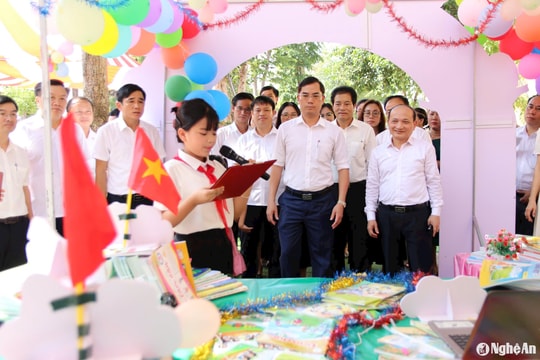Numerous full scholarships for Nghe An students to study in Russia
Students from Nghe An have the opportunity to access full scholarships from the Russian Federation, which allocates 1,000 scholarships annually to Vietnamese students.
On the morning of November 27, the Department of Foreign Affairs of Nghe An hosted a meeting with a delegation from the Embassy of Vietnam in Russia and representatives from Russian universities.
The delegation included Ms. Mai Nguyen Tuyet Hoa, First Secretary and Head of the Education Department of the Vietnamese Embassy in Russia, along with representatives from top Russian universities.
.jpg)
Providing updates on social developments in Russia, Ms. Mai Nguyen Tuyet Hoa noted that in 2024, Russia has welcomed many international delegations, including numerous visits from Vietnam.
Russia and Vietnam have maintained a longstanding educational cooperation agreement. Each year, Russia offers Vietnam at least 1,000 scholarships. However, in the past five years, the number of Vietnamese students benefiting from these scholarships has not met Russia's expectations.
Currently, there are 5,000 Vietnamese students studying in Russia, but only 2,000 of them are part of the bilateral agreement. Since 2021, the number of students under this program has dropped to 400–500 annually.
Ms. Hoa acknowledged that one key reason for this decline is the lack of accessible information about these opportunities, combined with a decreased interest in studying in Russia.
Under the agreement, the Russian government provides full tuition waivers for full-time students, along with subsidized dormitory fees comparable to those for Russian students. Additionally, the Vietnamese government supports students with living allowances, insurance, and round-trip airfare.
To date, Russia offers the most intergovernmental scholarships to Vietnam, followed by Hungary, which provides 200 scholarships annually.
The Vietnamese Embassy in Russia is focused on effectively utilizing these 1,000 scholarships by introducing them to more localities, enabling students, officials, and staff to learn about study opportunities in Russia. Currently, the Vietnamese community in Russia numbers around 80,000.
Russia is renowned for its strong education system, particularly in basic sciences, applied sciences, engineering, healthcare, arts, and emerging fields like IT, nanotechnology, and energy.
Addressing concerns about language barriers, Ms. Hoa explained that Russian universities offer a one-year preparatory course in the Russian language before students begin undergraduate or master's programs. The tuition for this language course is fully covered by the Russian government.
In addition to student training, Russia also offers short-term professional training programs for officials, typically lasting 2–3 months, conducted in Russian or through interpreters.
.jpg)
During discussions about Nghe An, leaders of the Department of Foreign Affairs highlighted that the province ranks 12th among Vietnam’s 63 provinces in national high school exam results for 2024 and serves as an educational hub for North Central Vietnam.
Nghe An has established cooperation in various fields with Russia’s Ulyanovsk Province. Phan Boi Chau High School for the Gifted in Nghe An has a partnership with Ho Chi Minh School No. 76 in Ulyanovsk.
Nghe An proposed that Russian universities provide training opportunities for Russian language teachers at Phan Boi Chau High School for the Gifted. They also requested information on short-term training programs for local officials and students. Additionally, they suggested developing detailed guides on academic programs at Russian universities to help students make informed choices.
Representatives from top Russian universities, such as the National University of Science and Technology MISIS, Moscow Polytechnic University, Moscow Power Engineering Institute, and Moscow State University of Geodesy and Cartography, provided detailed information on their academic programs and areas of expertise.



